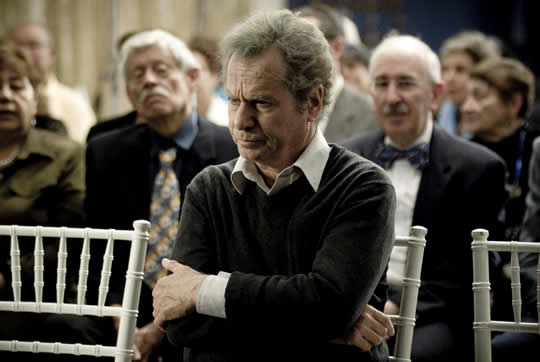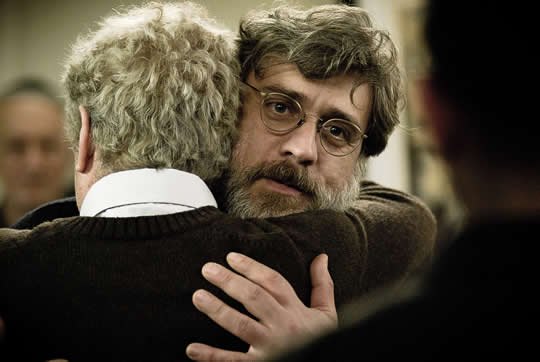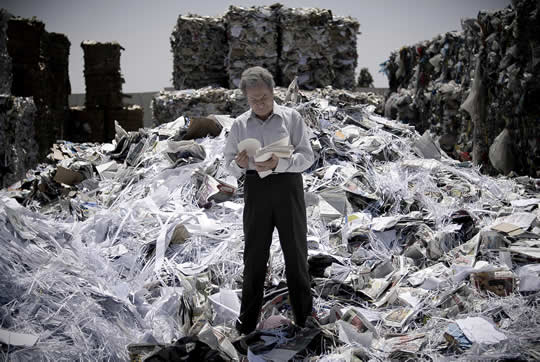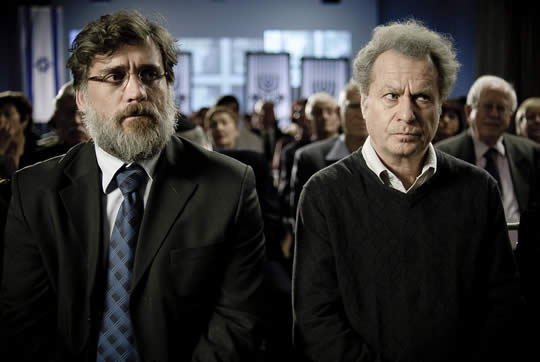 FOOTNOTE, directed by Joseph Cedar, is the tale of a great rivalry between a father and son. Eliezer and Uriel Shkolnik are both eccentric professors who have dedicated their lives to their work in Talmudic Studies. The father, Eliezer, is a stubborn purist who fears the establishment and has never been recognized for his work. Meanwhile his son, Uriel, is an up-and-coming star in the field who appears to feed on accolades, endlessly seeking recognition.
FOOTNOTE, directed by Joseph Cedar, is the tale of a great rivalry between a father and son. Eliezer and Uriel Shkolnik are both eccentric professors who have dedicated their lives to their work in Talmudic Studies. The father, Eliezer, is a stubborn purist who fears the establishment and has never been recognized for his work. Meanwhile his son, Uriel, is an up-and-coming star in the field who appears to feed on accolades, endlessly seeking recognition.
Then one day, the tables turn. When Eliezer learns that he is to be awarded the Israel Prize, the most valuable honor for scholarship in the country, his vanity and desperate need for validation are exposed. His son, Uriel, is thrilled to see his father’s achievements finally recognized but, in a darkly funny twist, is forced to choose between the advancement of his own career, or his father’s. Will he sabotage his father’s glory?
FOOTNOTE is a story of insane academic competition, the dichotomy between admiration and envy for a role model, and the very complicated relationship between a father and son.
FOOTNOTE is nominated for the Best Foreign Language Film Award at the 84th Annual Academy Awards.
Bijan Tehrani: How did you come up with this story?
Joseph Cedar: It was almost an accident. Someone called me to tell me that I was going to receive an award from the Italian government and, when I asked who else was receiving the award, the list of names did not make sense to me because all of the people that she mentioned were much more accomplished than I was and were much older than I was. So I asked her if, perhaps, she meant to call my father and she said had me hold on the line while she checked. While I was on hold, the idea for this movie came up.
BT: Did you write the script with any kinds of supplemental research, because all of the characters in your film are so real?
JC: I spent time discussing the themes that come up in the film with different people who work in the talent department at the university. That helped gain insight into the different tensions and issues that exist with these people, but it was not a film that required me to discover a completely new world because a lot of these characters are people that exist in my social circle or in my family and it is not really that far from my own personal life.
BT: How did you go about casting the film? Your actors deliver some very convincing performances.
JC: That is always a little miracle when it feels like the actors are really the characters that they are playing. I had some of the actors in mind while I was writing, and others came in for auditions and I thought they were right. What happens, from my experience, is that the actor will bring something to the screen that does not really exist in my head or in the screen play. It is something that they create and I found that, if I allow my actors to bring in their interpretation to the character, then it always feels a little bit more natural at the end. So it is not that these actors had to match what I thought they should be, they really brought their own creation to the screen.
 BT: How did you work with the actors? Did you have a lot of rehearsals with the actors prior to the shoot?
BT: How did you work with the actors? Did you have a lot of rehearsals with the actors prior to the shoot?
JC: Yes, I spent a lot of time with the actors before we started shooting. I don’t know if I would call it rehearsals, because it is not a rehearsal in the theatrical sense where we would stage a scene and see how it plays before the camera is rolling, but it is a time for us to discuss the script and to discuss the characters and just figure out if we’re really bringing out the potential that exists in the story to its maximum. I spent a few months with all the actors just discussing things and talking about the scenes.
BT: Did you allow the actors to have any kind of improvisation during the shoots?
JC: Sometimes, I make believe that they have some license to improvise but, at the end, I am not really that flexible when it comes to adding dialogue or changing dialogue. I always thought that it would be a shame to shoot something that comes up in the moment when you have had all of these months to think about it before. The screenplay is usually a better version of any improvisation that you could come up with at the last moment.
BT: Footnote is not naturally a comedy, but there is a lot of humor in it. Did you intentionally bring this dark sense of humor into the film?
JC: Well it’s a question of whether the tone of a film is ever really intentional. It’s the one thing that is out of your control and you only realize what the tone is when in you’re in the editing room and you see how the film functions, but I think that there is a general image that I have been using to describe the tone, and that is a tempest and a teapot. It has two sides to it, and if you are looking at it from the outside and these two characters are in a teapot, it all seems a little petty and a little funny. Then you are inside the teapot and you are one of these characters, then the tempest is really dangerous and threatening—you can drown and it is not a laughing matter. So there is always that duality in most good comedies. The characters have to be in some real jeopardy for us to find some real humor in it when we look at it from the outside.
BT: When I was watching your film, I found myself thinking that there is something Shakespearian in it when you look at the characters and their motivations. Did you draw  from Shakespeare or any other influences?
from Shakespeare or any other influences?
JC: Of course I am a fan of Shakespeare, but I am a fan in a way that I can never really accept him; I can never compare what I have done to what he has done. Shakespearian usually means that there is a drama that becomes a little bit bigger than life and ordinary occurrences. In that sense, I accept that there is a Shakespearian flavor to the story, but I don’t know if the themes are necessarily Shakespearian. I appreciate the comparison, though, and see it as a compliment.
BT: You don’t seem to worry about changing styles in your film—whether it is using captions, displaying information on the screen, or going back to the classic way of making films, it is very interesting how you blend these styles together so easily.
JC: It’s a result of the frustration that I have felt with my previous films where they did not allow me to really bring every idea that I had to the screen. There was always a certain formality to the way a story had to be told on film, and rigidity would leave out too many good ideas. With this film, we somehow found the freedom to mix styles and to ignore any kind of formal restrictions. We call them “footnotes” within the film, just like the footnotes in a text allow you to sway away from the main text and sometimes change your style or expand on something simply because you think its interesting or it takes the film in a different direction. I wanted to feel free to give the audience anything that I thought would enrich their involvement with this story.
BT: How has being nominated for best Foreign Language Film Award helped the film so far, and what would win the award do for you?
JC: I don’t know about winning, but so far it is clearly very good for the film because more people are aware of the film. That is probably the best way to regard these awards, because some of the other sides are sometimes embarrassing. Just like how the film itself demonstrates, an award can have two sides to it. On the one hand, it’s something that you are very proud of but, on the other hand, there is always something a little embarrassing about needing an award and admitting that it is something important to you—though I think it is very good for a film that otherwise would not get this kind of attention.
BT: Any new projects lined up?
JC: I am working on something, but it is so hard to talk about a film that is in early production because there isn’t much to share.
BT: That’s understandable. Good luck, and thank you so much for your time.

